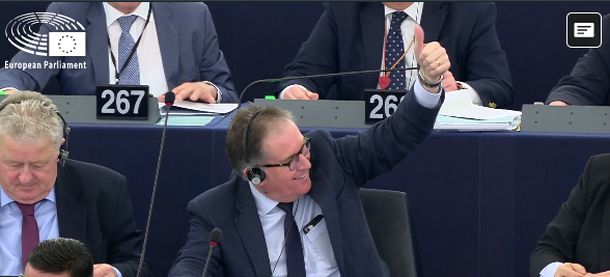Chair of the European Parliament's Fisheries Committee, Carmen Fraga, says that there will be problems renewing the agreement with Morocco. EFE, 30 June 2010.
EFE: Carmen Fraga says that there will be problems renewing the agreement with Morocco.
Translated by Western Sahara Resource Watch
Brussels, 30 June (EFE).
Source: http://www.abc.es/agencias/noticia.asp?noticia=438556
The chairwoman of the European Parliament´s Fisheries Committee, Carmen Fraga, said today in an interview with the Spanish news agency EFE that “there will be problems” renewing the fishery agreement between the European Union and Morocco, as this will terminate in 2011 and there are no efforts underway to renegotiate it.
Member of the European Parliament, Ms. Fraga has stated that since there is less than one year before the actual agreement terminates (March of 2011), there are “difficulties”, due to the issues related to Western Sahara, among various other reasons.
The agreement with Morocco, which is the most important in terms of fisheries, offers licenses to 119 vessels of the European Union, out of which one hundred are Spanish. In return, EU pays annually 36.1 million euros to Morocco which are being distributed to the fisheries sector and development programmes.
Fraga referred to the request made by the EU Commissioner for Maritime Affairs and Fisheries, Maria Damanaki, to the Moroccan authorities in order to provide information about how the money from the economic compensation received from the EU has been spent. Ms. Damanaki also requested information about whether the people of Western Sahara has benefited from this agreement.
The MEP Fraga stated that Ms. Damanaki will not ask the European Council for authorization to renew the fisheries agreement unless such information is provided, however, “Morocco will not give it to us”, she says.
Fraga said she did not agree with always binding this agreement with Western Sahara due to the problems of this territory. One should stop giving aid to Morocco in all areas, not only in the fisheries.
“If the fisheries agreement is not renewed, the Neighbourhood relation between EU and Morocco will continue, and so will also the transfer of 200 million euros which we will give them”, says Ms. Fraga.
On the other hand, Fraga emphasized that the agreement was poorly negotiated with respect to the licences to the Spanish fleet because there is an “underutilization” of the possibilities while the only fully exploited one is the pelagic industry by the Polish and Dutch fleets.
Therefore, Ms. Fraga has argued in favour of a modification of the agreement because in the current one several licenses were negotiated without considering the corresponding technical measures, which took place with the Moroccan ban on light-attraction fisheries which affected the Andalusian fleet, or in the case of trawling with respect to vessel size.
Also, Carmen Fraga, pointed to the fact that the European Commission and European Parliament´s present legislatures are “greener”, in the sense that all the political groups are more environmentally friendly.
This means sometimes, she added, that the attacks made by the Nordic countries on the fisheries agreements for being “not solidary” are unfair because some fleets benefit themselves directly – like the Spanish or French – while indirectly it is positive to all Europeans since they imply less reliance on imports, apart from development aid.
Furthermore, Ms. Fraga referred to the serious problem of piracy in Somalia, affecting vessels which fish in the Indian Ocean.
In this respect, the Eurodeputy believes that the protection of the vessels can be improved, for example by warning ships more often when the pirates\' “mother ships” leave their ports. Also, she stressed that the French operate with the presence of soldiers on board, and not with private security guards, like in the Spanish case.
Carmen Fraga insisted on the legality of the fleet which operates in the Indian Ocean, which has no other place to go and which also contributes with 60% of the GDP of countries like the Seychelles, Comoros and Madagascar.
On the other hand, Ms. Fraga criticised the refusal of the Commissioner Damanaki to finance ship scrapping as a part of her intentions to reform the Common Fisheries Policy (CFP).
According to Carmen Fraga, this could mean a “catastrophe” for the industry.
Likewise, she described as “unacceptable” the fact that no subsidies for scrapping have been granted to any of the shipowners who have asked for it, among them several Spanish ones.
Therefore, Ms. Fraga has asked for a specific community fund from which everybody can access support for ship scrapping “without any discrimination”. EFE
Here is the EU Council's legal advice on fishing in occupied waters
Hans Corell criticizes EU fisheries in Western Sahara
The former Legal Counsel to the UN Security Counsel, Mr. Hans Corell, comments on the EU's fisheries activities in Western Sahara.
EU Court reaffirms position on Western Sahara
Polisario has a case, but it should be pursued when the time is right, Court implies.
European Parliament disregards Court and adopts Morocco fish deal
Notwithstanding four consecutive rulings of the EU's highest Court calling such a practice illegal, the European Parliament has just now voted in favour of the EU-Morocco Fisheries Agreement that will be applied to the waters of occupied Western Sahara.


